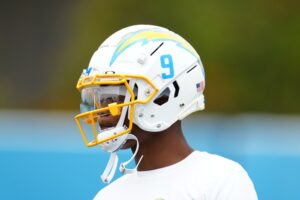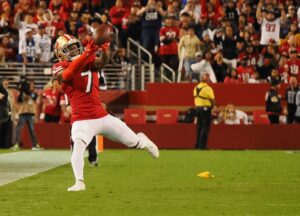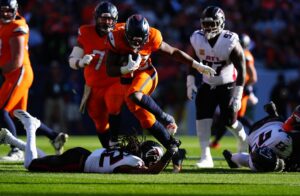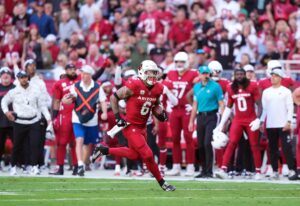After two weeks of impressive football (followed by a less-impressive home showing against the Minnesota Vikings) it still feels surreal to admit that the Daniel Jones era of the New York Giants has begun. The Eli Manning stunt double made his debut in Week 3 against the Tampa Bay Buccaneers, and assisted the team to their first win of the regular season; the result of dramatic and excellent signal-calling by Manning’s successor.
Manning, now warming the bench behind the Giants first-round draftee, will have new responsibilities as Jones continues to lead the franchise back to the record they have long strived for. He’s already made a mentee out of Jones, whose first career start boasted stats that made the likes of Tom Brady and Aaron Rodgers look unimpressive.
Now, however, the stakes are higher. If Eli Manning was to retire at the end of the season (which would not only coincide with the ending of his contract, but also provide the best end-game for his Hall of Fame candidacy), he would end his professional quarterbacking career not only with dignity, but the start of a new resume, as Daniel Jones’ personal quarterback coach.
Eli Manning Posed To Be the Next Quarterback-Turned-Coach in the NFL
Those Who Came Before
It’s not like Eli Manning’s transition to coaching would be anything out of the ordinary. Even current Giants head coach, Pat Shurmur, had a bit of a playing career before taking such a path. Doug Marrone and Anthony Lynn both played professionally first, as did Ron Rivera, who was the first Puerto Rican to play on a Super Bowl championship team. Mike Vrabel won three NFL titles as a linebacker for the New England Patriots. Bruce Arians and Sean McVay had college careers. But an overwhelming amount of current head coaches specifically played quarterback professionally, both inside and out of the NFL.
Jason Garrett, Dallas Cowboys Head Coach
The most famous case, of course, is Jason Garrett, who famously quarterbacked for his current franchise and Eli Manning/Giants division rivals, the Dallas Cowboys. His career began at Princeton, before transferring to play at Columbia under his father Jim’s coaching regime. He transferred back to Princeton after his father’s resignation (the team went 0-10 that season), and ultimately received the Asa A. Bushnell Cup as the Ivy League player of the Year in 1988. He continues to hold the Ivy League career record for completion percentage.
After signing with and being waived by the New Orleans Saints, he started playing professionally in the World League of American Football. But with his father’s help, he was signed by the ‘boys as a free agent in 1993, and after briefly being released to the practice squad, he impressed in preseason and made the team as a backup to Troy Aikman. In his six-season Cowboys career, he had many opportunities as starter. He was part of the 1993 and 1995 Super Bowl-winning teams, and in his career, played in 39 Cowboys games.
From the 2000-2003 seasons, Garrett joined rival Giants to back up Kerry Collins. In 2002, he was released and then resigned for salary cap reasons, but was declared inactive in 16 games after Jesse Palmer passed him on the depth chart as backup. Garrett finished his playing career in brief stints on the Tampa Bay Buccaneers and Miami Dolphins squads, and then went on to help coach the Dolphins under Nick Saban from 2005-2006, before being signed as Dallas’s offensive coordinator in 2007. His duties increased over time, and he was officially named head coach in 2011.
Doug Pederson, Philadelphia Eagles Head Coach
At Northeast Louisiana University, Doug Pederson still holds multiple passing records. Pederson was originally signed as a rookie free agent by the Dolphins in 1991, but was waived before the start of the regular season. After a year of free agency, he was drafted by the New York/New Jersey Knights of the World League of American Football, where he backed up Reggie Slack for a few months. When the season finished, he was signed and then dropped a few more times by the Dolphins, and eventually made his NFL playing debut in 1993. He went on to receive a Super Bowl ring as a backup with the Green Bay Packers in the 1996 season, then had stints with the Philadelphia Eagles and Cleveland Browns before rejoining the Packers to replace Matt Hasselbeck as backup quarterback.
Pederson became Cavalry Baptist Academy’s head coach in 2005, before beginning his NFL coaching career in 2009 with the Eagles. After serving as the Kansas City Chiefs offensive coordinator from 2013-2015, he was awarded his first and current professional head coaching job back with the Eagles in 2016.
Kliff Kingsbury, Arizona Cardinals Head Coach
This year may be Kliff Kingsbury’s first as a coach in the NFL in any capacity, but he’s no stranger to the league. Drafted by the Patriots out of Texas Tech, where he held many NCAA Division I passing records in his time, he won a Super Bowl ring in his rookie year, despite being on IR and not seeing the field. Kingsbury never spent more than one season with a team in his playing career, but his resume boasts the Saints, the Denver Broncos, the New York Jets, the Cologne Centurions, the Buffalo Bills, the Montréal Alouettes, and the Winnipeg Blue Bombers.
Kingsbury coached at Houston and Texas A&M before landing his first head coaching job at his alma mater, where he worked from 2013-2018. It was his success there that allowed him to leap directly into the Arizona Cardinals head coaching job this year.
But That’s Not All…
Matt Nagy set various school passing records at the University of Delaware from 1997-2000, before joining the AFL. In a second internship with the Eagles, backup quarterback Kevin Kolb suffered a knee injury and Nagy, despite being an unpaid coach, was allowed by the NFL to play for the team. The deal was later voided because Nagy was still under contract with the AFL. After assisting and coaching with the Eagles from 2008-2012, he coached with the Chiefs in two different roles over two seasons, before becoming head coach of the Chicago Bears in 2018.
Zac Taylor quarterbacked at Wake Forest, Butler Community College, and Nebraska. He went undrafted in 2007, and was signed as a rookie free agent by the Bucs before getting cut in preseason prompting him to join the Winnipeg Blue Bombers, where he never saw the field. Coaching better suited him, and Taylor had coaching stints in the NCAA and the NFL back and forth before taking his current job with the Cincinnati Bengals.
Frank Reich backed up Boomer Esiason at Maryland for three years before being drafted by the Bills, and having subsequent short stints with the Carolina Panthers, the Jets, and the Detroit Lions. After ten years off, he began his coaching career with the Indianapolis Colts, and then serves with the Cardinals, Los Angeles Chargers, and Eagles (where he helped win Super Bowl LII) before earning his first and current head coach-ship back with the Colts last year.
Offensive mastermind Sean Payton of the Saints, Jay Gruden of the Washington Redskins (oops), and Freddie Kitchens of the Browns all played quarterback.
And these are just the *current* NFL head coaches. But 10 for 32… now *that* is a significant digit.
A Pre-Paved Path for Eli Manning
The nature of the quarterback position is, in many ways, an extension of a coaching job. The plays are designed and assigned by the man on the sideline, and it’s then up to the quarterback to delegate, lead the play off, and read the field, accommodating that which cannot be prepared for. It’s no wonder so many quarterbacks of the past have continued their NFL tenures in coaching positions. The role itself is almost designed as a segue.
Eli Manning might not end his career upon the season’s end. Perhaps the Giants will re-sign him to back up DJ for another year. Maybe another team will find use for him, or do him the favor of keeping him on the field should he desire to be there (lord knows that Mannings are very well-connected with multiple franchises in the league). None of these options lend themselves to Eli Manning’s Hall of Fame candidacy, but his passion for the football most definitely extends beyond the New York Football Giants; the team that built him up only to cut him down twice in the last two-ish years.
But if Eli plays his cards right with the media, his organization, and his newest pupil, he could really be onto something as he approaches the next phase of his career as a football professional. And like many of those who came before, that something could be a new kind of successful football career.
Main Photo:
Embed from Getty Images






